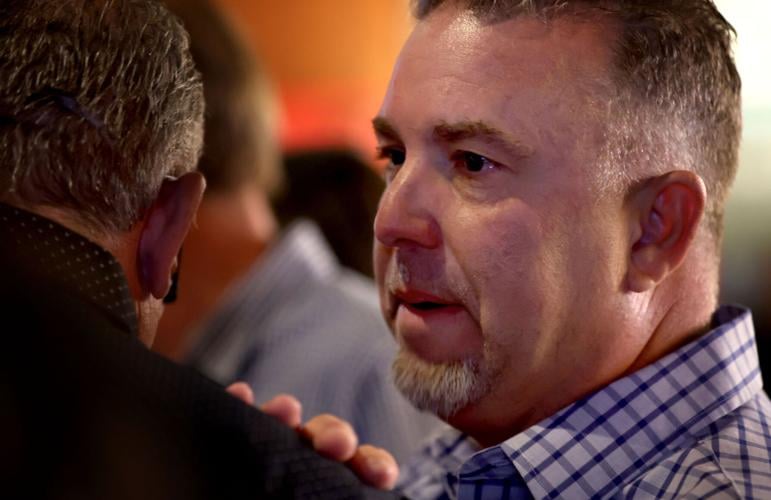Democratic incumbents swept Tucson’s election night, keeping control of three city council seats and the mayor’s office.
Now, with four more years on the horizon, the city’s re-elected leaders are making plans to address a multitude of challenges facing the city.
Mayor Regina Romero won big last night, beating Republican challenger Janet Wittenbraker with 61% of the vote, according to unofficial election results.
“2019 was about making history, and 2023 is about us and how we move together, Tucson. It’s about what we still need to accomplish,” Romero said Tuesday night.
A former three-term city council member, Romero became the city’s first Latina mayor in 2019.
When her reelection campaign was announced in February, Romero said her priorities were to keep Tucson safe, affordable, sustainable and economically prosperous.
While current leadership has made lots of progress towards this safer, economically vibrant goal, there’s still a lot of work to be done, Romero said.
“Last night was a happy evening because it not only marked the end of our campaign, but another four years voters so graciously gave us to continue the work we started,” she said Wednesday.
After winning reelection, Tucson Mayor Regina Romero speaks on Nov. 7, 2023 at Brother John's Bourbon and BBQ.
Tackling issues on the forefront of Tucsonans’ minds is difficult, Romero said, because the priorities of the people don’t just change from election-to-election, but throughout terms as well.
“It changes, it always changes ... It’s very important as a public servant and elected leader to pay attention to the needs of the community,” she said. “In 2019, what we were (hearing) from voters are their concerns of water resources, climate change and how we were not prepared as a city to confront the changing climate, the heat and the drought.”
Romero’s push in 2019 for improvement of Tucson roads was met, when Tucson voters ushered in Proposition 411 in 2022, a projected-$740 million proposition meant to rebuild community roads throughout the city, funded by extending the existing half-cent sales tax for an additional 10 years.
“What we heard in 2019 and what we hear now is that people are very interested in making sure that we have a plan to fix our roads. That hasn’t changed, those needs have been there for decades, so we acted on that (and continue) to act on that.”
The homelessness problem in Tucson hasn’t been around for a year, or five, or even a decade. Nor is this a Tucson-exclusive issue. The problem is, in the mayor’s opinion, a lack of attention to the problem from county, state and federal agencies.
“Unsheltered homelessness has been an issue for our country for many, many decades. But what we’ve seen with the pandemic, it exploded,” she said. “I’ve served (the city) for 16 years, we have never seen the explosion in homelessness in the first 12 years of me serving.”
“Comparing notes with other mayors throughout the country, they feel the same way. But I think it’s decades-worth of ignoring the problem, and so here in Tucson what we started to do, thanks to federal funds really, we created housing-first programs and continued funding nonprofit organizations that serve our homeless community,” Romero said. “It’s really all hands-on deck in terms of affordable housing and our sheltered homeless population here.”
The Housing First program started in 2020 is a first-of-its kind approach for Tucson. It’s an evidence-based approach that centers on quickly moving people who are experiencing homelessness into independent, permanent housing, followed by additional resources provided by the city as needed.
“What I do know, is that the mayor cannot do it alone. This should be the responsibility of Pima County, the state of Arizona and the federal government,” she said.
Lane Santa Cruz, the incumbent in Ward 1, had a decisive victory to keep her post, winning about 63% of the vote against Republican challenger Victoria Lem.
On election night, an emotional Santa Cruz showed her exuberance winning a second term.
“As much as we get criticized, we get (stuff) done. We get (stuff) done in the city of Tucson... It happens because people have a vision and a strategy to make things happen,” they said. “Women find a third way. That’s what’s so important about having women and queer people in office.”
During the first term, Santa Cruz focused on implementing racial equity in Tucson’s government, creating affordable housing strategies and supporting a fare-free transit system
“ I feel that trust, and the mandate from the community to continue the work,” Santa Cruz said. “(Last night) told me that (voters) want to feel heard, they want to feel seen. I think there’s a lot of optimism (here), there’s a lot of hard things happening globally and at the national, so at the local level I think folks are looking for something to keep them connected, keep hope (and) faith.”
For the next term: continue their ward’s work on creating safer streets, as well as finding more way to get affordable housing to those in need.
“ The city just acquired the rest of that property on Stone and Speedway to do some housing and mixed-use development, so I’m excited to continue pushing the envelope when it comes to creating more housing here in the city of Tucson,” Santa Cruz said. “I’m really excited to see the neighborhood repaving as a result of Prop. 411.”
“We’re finally seeing movement with Proposition 407 and the parks in Ward 1, (like) Joaquin Murrieta Park,” Santa Cruz said. “It makes me happy to drive there and stop because it’s about to go under construction for the next year.”
Tucson City Council member Paul Cunningham, a Democrat, easily won his bid for a fourth term Tuesday night.
In the Ward 2 race, Cunningham had just over 64% of the vote so far to Republican challenger Ernie Shack.
Cunningham, a teacher at Gridley Middle School, was first appointed to the Ward 2 office in 2010 and elected in 2011. He’s a former juvenile probation officer and has been a public school teacher for more than 10 years.
During his latest four years in office, Cunningham said he’s “most proud of getting us through the pandemic minimizing the damage inflicted.” The focus now, Cunningham said, is dealing with pandemic-related consequences such as housing shortages and the growing unsheltered population.
Cunningham says his top priority is to keep working on infrastructure improvement, community safety and water conversation policies.
“If anything, (the incumbent sweep) tells us Tucson is becoming more-and-more a city where the Democrats have a higher advantage in winning,” Cunningham says.
“The results in Ohio, in Virgina, coupled with what happened here as a microcosm, are definitely something to look at,” he said. “If you’re a Democrat this gives you a lot of optimism for 2024, but I think that’s a long road. I mean, we’ve got a year.”
Nikki Lee, a Democrat, cruised to a second term Tuesday night collecting about 65 percent of the vote over Republican challenger Ross Kaplowitch.
Lee, an executive and leadership coach, was first elected to City Council in 2019 after serving in the Air Force and working in the cybersecurity industry.
Lee has said she feels the council has made significant progress in promoting affordable housing and made great strides for local road improvements through the passing of Prop 411. Looking ahead, the council member said her main concerns are the city’s staffing levels and the workforce’s ability to deliver “high-quality services,” especially through voter-approved initiatives that provide funding for parks, roads and public safety.







